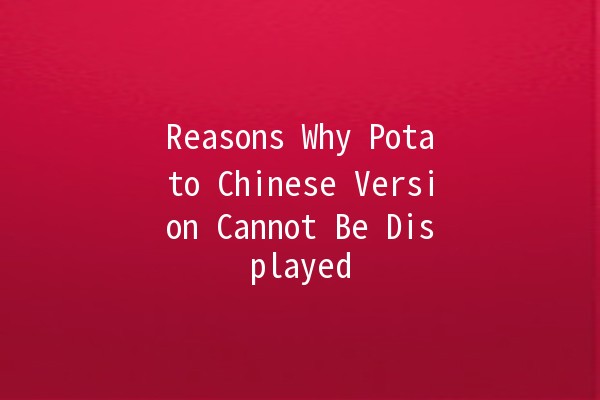In the world of digital applications, users often encounter frustrating issues that can hinder their experience. One such problem is when a specific version of an application, like the Potato Chinese version, fails to display correctly. Understanding the reasons behind this issue can help users troubleshoot effectively and restore functionality. In this article, we will delve into the main reasons why the Potato Chinese version fails to show, alongside productivity tips to ensure users can manage similar issues better in the future.
Overview
One of the most common reasons for applications not displaying correctly is compatibility issues. This could arise if the device's operating system is not supported by the version of Potato being used.
Practical Application
Check for Updates: Ensure that both the Potato application and your device's operating system are up to date. For instance, if you're using an older version of Android or iOS, the Potato Chinese version may not function correctly. Regularly checking for updates can prevent these issues.
Device Specifications: Check whether your device meets the minimum specifications required to run the Potato Chinese version smoothly. If your device hasn’t been updated in a while, consider upgrading to a more recent model. Using resourceheavy applications on older devices can lead to display failures.

Overview
Sometimes, the files that make up the Potato application can become corrupted due to various reasons such as incomplete downloads, abrupt shutdowns, or malware attacks.
Practical Application
Reinstallation: If you suspect corrupted files could be causing the issue, uninstall and then reinstall the Potato Chinese application. This action can often restore functionality by replacing corrupted files with fresh ones.
File Integrity Check: Use builtin operating system tools to check the file integrity of applications, if available. For example, Windows users can use the System File Checker tool to scan for issues.
Overview
Applications like Potato may default to languages based on system settings. If your device settings are not configured correctly, it may prevent the Potato Chinese version from loading properly.
Practical Application
Adjust Language Settings: Go to the device settings and ensure that the language is set to Chinese. Check in the Potato app settings as well to confirm that it is configured to display content in the desired language.
Clear Cache: Sometimes, cached data might interfere with language settings. Regularly clearing the app's cache can help resolve discrepancies. Users can navigate to the app management section in settings and select "Clear Cache."
Overview
A stable internet connection is essential for applications that rely on server data to function correctly. Poor connectivity can lead to display issues.
Practical Application
Test Internet Connection: Ensure that your device has a stable and reliable internet connection. You can run speed tests or try connecting other devices to the same network to diagnose whether the issue lies within your internet service.
Switch Connection Types: If you are on WiFi, try switching to mobile data or vice versa. Sometimes, resetting your router or toggling airplane mode can help refresh your network connection.
Overview
Using an outdated version of the Potato application can lead to display failures. As developers release new features or fix bugs, it’s crucial to have the latest version installed.
Practical Application
Set AutoUpdates: To avoid running into display issues caused by outdated applications, enable autoupdates for installed apps. This ensures you are always using the latest version of the Potato Chinese application.
Manually Check for Updates: Regularly check the app store for updates. Not only does updating the app improve performance, but it also often comes with fixes for existing bugs that could hinder functionality.
FAQs about Potato Chinese Version Display Issues
If reinstalling the app does not resolve the display issue, consider checking your device's permissions for the app. Sometimes, restricting permissions can lead to functionality problems. Go to your device settings, view app permissions, and ensure that Potato has the necessary permissions enabled.
Yes, if you have a firewall or antivirus software running, it may block Potato from accessing the internet properly. Check your firewall settings to ensure that Potato is allowed through. Temporarily disabling the firewall can help diagnose whether it is the cause of the problem.
This could be due to compatibility issues, as different devices may have different specifications, operating systems, or configurations. Always compare the specs and settings of both devices to pinpoint discrepancies that may lead to display issues.
On Android, navigate to the Google Play Store, tap on your profile icon, and select "Manage apps & device" to check for updates. For iOS, open the App Store, tap on your profile, and scroll down to view pending updates. On Windows, you can check the Microsoft Store for updates for installed applications.
Regional restrictions can limit access to specific applications. Consider using a VPN to change your device's location settings. Ensure that using a VPN complies with your regional laws and Potato's terms of service.
If Potato continues to crash, it may be worth contacting customer support for the application. They can offer solutions tailored to your specific situation. Additionally, reviewing online forums for similar issues can provide insights into potential fixes implemented by other users.
Understanding why the Potato Chinese version cannot be displayed properly can dramatically improve user experience and productivity. By following the outlined tips and addressing the common issues mentioned, users can ensure that their interaction with the app remains seamless. If problems persist, always consider reaching out for professional support to resolve deeper issues.